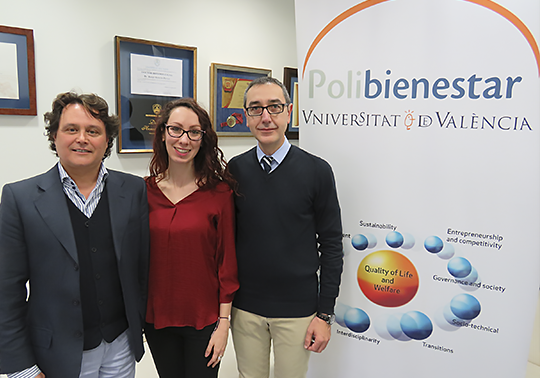A study suggests increasing the social policies to make sustainable the Mediterranean welfare model
- May 8th, 2017

Jorge Garcés, Francisco Ródenas and Carla Vidal, from the Institute for Social Welfare Policies (Polibienestar) of the Universitat de València, conclude that a great effort in social policy is needed. It is also necessary to increase the citizen awareness to make de Mediterranean welfare state sustainable. In an article published in the journal ‘Social Indicators Research’ it is highlighted that Spain is not in the European average in terms of the value of the social policy index (IPS), a tool that compares the trust of the population in the governability and the commitment in social security of the governments.
According to Jorge Garcés Ferrer, director of Polibienestar and full university professor of Social Policy, “nowadays Spain has the highest aging rate in Europe and the resources that we are investing in are below the continental average. To make the Mediterranean model sustainable, there is a need of major effort in public social policies. If we do not change the system, this will not be viable in 20 years”.
In this sense, the use of massive data (Big Data) and Information and Communications Technology (TICS) by governments “will have a great influence in the determination of the sustainability of social models, including the Mediterranean one”, states the researcher.
The article «Application of Social Policy Index (SPI) Amended in Three OECD Countries: Finland, Spain and Mexico» has compared the social policies of the Nordic (Finland), Mediterranean (Spain) and Latin American (Mexico) models between 2005 and 2010 with the Index of Social Policy (IPS). The experts highlights that the model of Nordic countries involves a great expense in social protection and a high tax regime in comparison to the Mediterranean one. The latter has an outlay mainly in old-age pensions and social protection. The fact that a high unemployment is characteristic of the Mediterranean model, contributes to a medium IPS result. The Latin American model has an irregular labour market, low social benefits related to employment and a great amount of private pensions. For these reasons, this model has the lowest marks.
Jorge Garcés y Francisco Ródenas, from Polibienestar, and Carla Vidal, from the Faculty of Social Sciences of the Universidad de Concepción (Chile) have also analysed the situation of the public opinion in relation to the policies of each country. The trust of the population related to the governability of their countries is reflected in this study, which is based on the OCDE data in 2014. According to the article, “there are great differences among the three models; in Finland an 82% of the population trust on their governors, in Spain there is a decrease of 50%, and in Mexico the percentage is 38%. The average that OCDE offers is the 56%, so Spain as well as Mexico are below this figure”.
Regarding social security, the employment establishes a common pattern for European countries because those have a contributory model. However, Norway presents a mixed model that guarantees a minimum income for pensioners, whereas Spain has a contributory scheme linked to the income of each employee. According to the article, in the Mexican model the social security value is extremely low (it tends to a privatisation model). “Within the Larin American context, despite the disparity is high and presents a low capacity of social protection systems, the economic and social impact of the global crisis was lower than in the OCDE zone”, point out Garcés, Ródenas and Vidal.
In we compare the Social Policy Index (IPS) of the three models during five years, Finland presents a great deal of effort in its policies. But, despite having a high mark, its IPS value decreases between 2005 and 2010. In the case of Spain, the highest value of this indicator is in 2008 and goes down the next two years due to an economic crisis. On the other hand, Mexico has the lowest IPS and has the highest in 2006.
The explanation of the experts about the difference in priorities in relation to social expenses derives from the different distribution of the populations related to age. In this way, Mexico is considered as a “young country” because only the 6% of the population is older than 65 years, contrary to Norway which has a 18,5%. These differences are reflected in the GDP of each country. The investment in pensions and education of Norway and Mexico are different because they present distinct social contexts.
Polibienestar is a public institute of the Universitat de València. It is specialised in research, innovation, social technology, technical advising and training in the field of social policies and its objective is to improve the welfare and quality of life of the society.
Article:
Garcés Ferrer, J., Ródenas Rigla, F. & Vidal Figueroa: «Application of Social Policy Index (SPI) Amended in Three OECD Countries: Finland, Spain and Mexico». C. Soc Indic Res (2016) 127: 529. doi: 10.1007/s11205-015-0988-4
File in: Institut Universitari d'Investigació de Polítiques de Benestar Social (Polibienestar) , Facultat de Ciències Socials , Grups de recerca
















